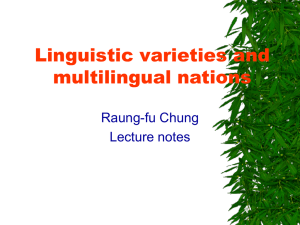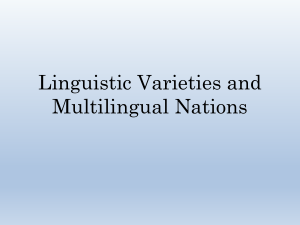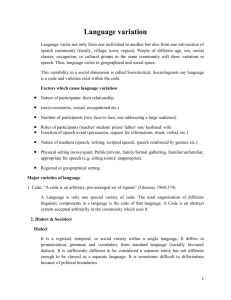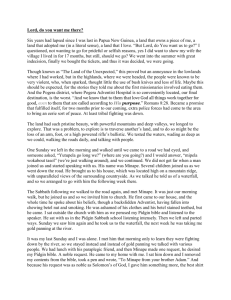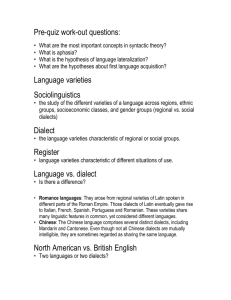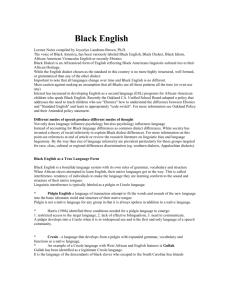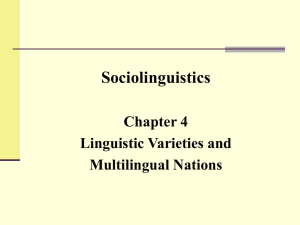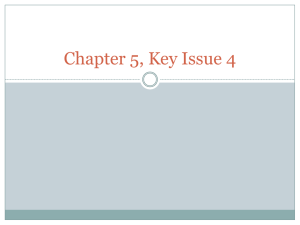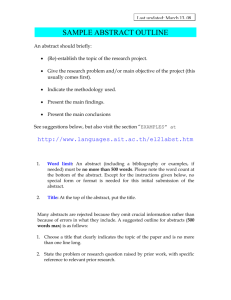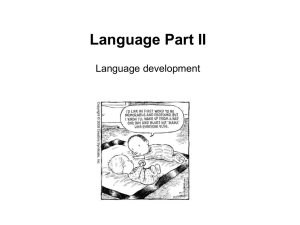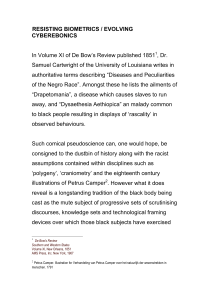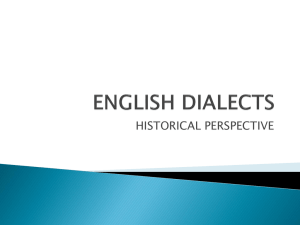An invitation to the study of Sociolinguistics
advertisement
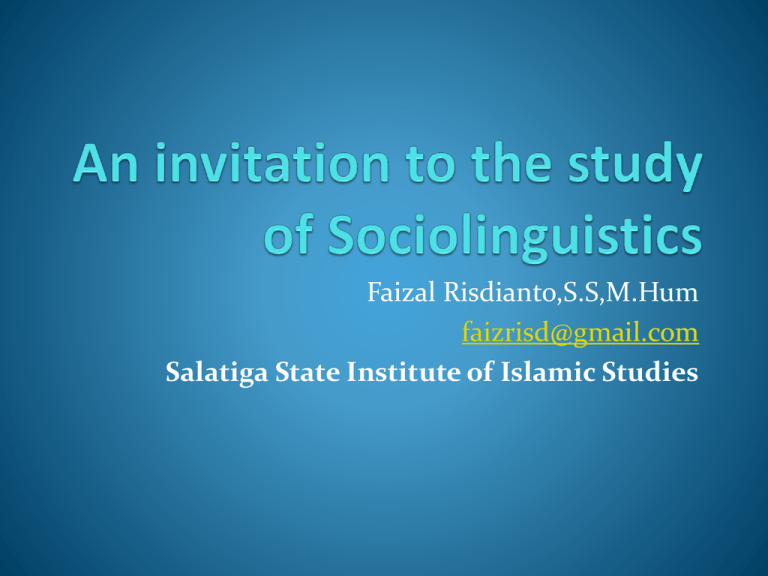
Faizal Risdianto,S.S,M.Hum faizrisd@gmail.com Salatiga State Institute of Islamic Studies More definitions Criper and widowson (1975):Sociolinguistics is the study of language in operations; its purpose is to show how the conventions of language use relate to other aspects of culture. Hudson, Hymes, Fishman (1980) : the study of language in relation to society. Nababan (1984): “Sociolinguistik adalah kajian atau pembahasan bahasa sehubungan dengan penutur bahasa itu sebagai anggota masyarakat. Speech variety: a term sometimes used instead of LANGUAGE, DIALECT, SOCIOLECT, PIDGIN,CREOLE etc. it is used because of it neutrality than such terms. Dialect: a variety of a language, spoken in one part of a country (regional dialect), or by people belonging to a particular social class (social dialect or SOCIOLECT), which is different in some words, grammar and/or pronunciation from other forms of the same language. A dialect is often asscociated with a particular accent. Ex: banyumas javanese vs solo & jogja javanese, American and British English, etc. Sociolect is a variety of a language (a DIALECT) used by people belonging to a particular social class. The speakers of a sociolect usually share a similar socioeconomic and/or educational background. Sociolects may be classed as high ( in status) or low ( in status). Idiolect is the language system of an individual as expressed by the way he or she speaks or writes within the overall system of a particular language. Ex: the idiolects of Soeharto and Harmoko in the new order era of Indonesia. Jargon is a speech or writing containing specialized words or constructions : the jargon of law, medical jargon, political jargon. Ex: YES WE CAN by Obama, Mari kita cintai produk dalam negeri by Indonesian political leaders. Nasdem, gerakan perubahan? The term “jargon” is typically used by those unfamilar with that particular type of language, and /or by those who dislike it. Slang . Words or expression used especially in very informal situations among close association. Argot is a variety of language often used for a secret communication therefore understood exclusively by the members of a group who form such a language. The Jakartan bahasa prokem was originated from the language of underworld/thugs but then gradually it was popular slang language among youngster at that moment. Bokap-nyokap=bapak,ibu. Bo’il=mobil, rosada=saudara. Code switching (alih kode) . A change by a speaker (or writer) from one language or language variety to another one. Code switching can take place in a conversation when one speaker uses one language and the other speaker answers in a different language. Code mixing (campur kode) . A situation where two or more languages or varieties of a language are mixed in a conversation. Argot is a variety of language often used for a secret communication therefore understood exclusively by the members of a group who form such a language. The Jakartan bahasa prokem was originated from the language of underworld/thugs but then gradually it was popular slang language among youngster at that moment. Bokap-nyokap=bapak,ibu. Bo’il=mobil, rosada=saudara. PIDGIN is a language which develops as a contact language when groups of people who speak different languages come into contact and communicate with one another, as when foreign traders communicate with the local population or workers on plantations or in factories communicate with one another or with their bosses. A pidgin usually has a limited vocabulary and a very reduced grammatical structure which may expand when a pidgin is used over a long period of time or for many purposes. For example, Tok Pisin (a new guinea Pidgin). Ex: Yu ken kisim long olgeta bik pela stua which means “You can get it at all big stores”. CREOLES & PIDGIN Cr eoles is a PIDGIN language which has become the native language of a group of speakers, being used for all or many of their daily communicative needs. Usually, the sentence structures and vocabulary range of a creole are far more complex than those of PIDGIN language. CREOLES are usually classified according t the language form which most of their vocabulary comes, eg English-based, French-based, Portuguesebased, and swahili-based creoles. Examples of englishbased creoles are Jamaican Creole, Hawaiian.
